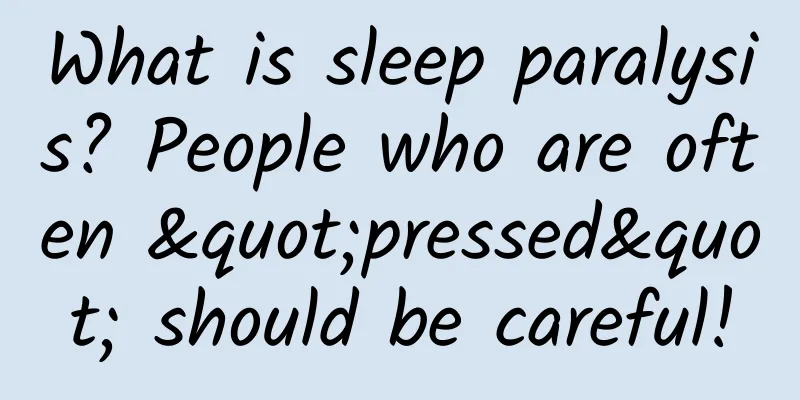What is sleep paralysis? People who are often "pressed" should be careful!

|
Ms. Li, 24 years old, often works overtime and stays up late due to the nature of her job. Recently, Ms. Li found that her sleep quality is very poor. She often wakes up suddenly from a deep sleep. She feels that her consciousness is very clear and she can hear the sounds around her, but her body seems to be pressed down by a heavy object. She wants to call for help from her family, but she can't open her mouth . Her body seems to be controlled by evil spirits and cannot move. When she finally woke up, she found that there was no one around, and she didn't really move or make any sound. When she talked about this with her friend, she thought she might be "possessed by evil spirits". However, her friend said that it was not certain and it might be "sleep paralysis". She suggested that she go to the sleep department of the hospital for a check-up. After learning about Ms. Li's situation, the doctor explained that this symptom is indeed what people commonly call "sleep paralysis" or "ghost pressing on the body". In medicine, it is a sleep-related symptom called sleep paralysis . Patients usually experience weakness in their limbs when they are about to wake up or just fall asleep, and may also experience shortness of breath and hallucinations . These symptoms usually last about 10 minutes before they can fully recover, and they can recur. Some patients with narcolepsy often have sleep paralysis, and they need to undergo polysomnography and further multiple sleep latency tests to confirm the diagnosis. 01 What exactly is sleep paralysis? "Sleep paralysis" is medically called sleep paralysis , also known as sleep paralysis and nightmare. It is a common type of sleep behavior disorder and often occurs when people are asleep and dreaming. When people are dreaming, all muscles in the body, except for the respiratory muscles and eye muscles, are in a state of extremely low tension. This is to avoid hurting themselves by making movements in dreams during sleep. During the dreaming process, for various reasons, the consciousness is awake, but the muscles remain in a weak state, that is, "the consciousness is awake, but the body is not yet awake." Patients may experience a brief, terrifying experience of being unable to move voluntarily during sleep, usually accompanied by hallucinations, anxiety, fatigue and tiredness, which often lasts 1 to 3 minutes. Research reports show that 40% to 50% of people are likely to experience sleep paralysis at least once in their lives. It can occur at any age and is more common in adolescence or young adults. Among them, people aged 10 to 25 have a higher probability of suffering from sleep paralysis than people in other age groups. People with mental disorders such as post-traumatic stress disorder, anxiety, depression, etc. have a higher probability of suffering from the disease. Rapid eye movement related Sleep paralysis usually occurs when the sleeper is about to fall asleep, or in the morning, when the sleeper is about to wake up. It is a sleep disorder caused by the overlap of the rapid eye movement (REM) phase and the wakefulness phase in the sleep cycle . After falling asleep, people gradually transition from the first stage to the third stage, entering a stage of deep sleep with complete unconsciousness, collectively known as the non-rapid eye movement (REM) stage. When we return to the first stage of sleep, we enter the rapid eye movement sleep stage, which is the only state that causes sleep paralysis. During the REM stage, our brain is active, which is closely related to our dreams. At this stage, except for the eyes and respiratory tract, our muscles are paralyzed, which means that your brain is awake but your body is not. 02 Where does sleep paralysis come from? 4 reasons 01 Improper sleeping posture The occurrence of sleep paralysis is largely related to improper sleeping posture, such as pressing the chest with the hands , covering the head , or sleeping on one's stomach , which leads to poor breathing and blood circulation, and can easily cause "sleep paralysis". Other studies have found that sleeping on your back is more likely to cause sleep paralysis than sleeping on your side. 02 High stress and irregular work and rest schedule High stress in life, irregular work and rest schedules , frequent staying up late, excessive fatigue, and even insomnia and anxiety can easily cause the phenomenon of "sleep paralysis". Studies have found that shift work, long-distance travel, crossing different time zones in a short period of time, lack of sleep and other situations that disrupt sleep patterns can increase the risk of sleep paralysis. 03 The sickly This situation may occur in patients who are frail or have narcolepsy, such as those suffering from cerebrovascular disease, anemia, hypotension, etc. 04 Overeating before bed If you eat too much before going to bed, it may also cause sleep paralysis, because excessive feeling of fullness can easily cause poor blood circulation. At the same time, the bloated gastrointestinal tract will put pressure on the surrounding organs , making the cells in the corresponding parts of the brain active, inducing sleep paralysis, nightmares, etc., making people feel extremely tired after waking up. 03 Don't panic if it happens occasionally, but seek medical attention if it happens frequently Sleep paralysis usually has no complications, and everything returns to normal after the attack. Generally, no special treatment is required. Sleep paralysis can disappear on its own or with external stimulation , so there is no need to worry too much, just be patient and wait for a while. In addition, pay attention to developing good work and rest habits, avoid excessive fatigue and tension, and sleep on your side when necessary to prevent it from happening again. If the patient wants to get rid of it as soon as possible, the following methods can be used to relieve it: 1. Ability to move the eyeballs quickly , up and down, left and right, and blink. 2. Move your mouth muscles and tongue , then gradually start moving your neck, shoulders, arms, legs, ankles and toes. After these muscles can move, sit up and move your whole body. If the attacks still occur frequently and cause some trouble to your life , you need to seek treatment from a professional doctor. You can go to the sleep disorder clinic or the psychological clinic for treatment. You can also take oral drugs such as venlafaxine, oryzanol, duloxetine, etc. for treatment. 04 6 small measures to prevent sleep paralysis 1. Regular work and rest schedule: It is best not to stay up late at night, go to bed and get up on time every day, ensure adequate sleep time, and the nap time should not exceed 1 hour . Reminder: The more you sleep , the better. Sleeping too long will cause people to experience dizziness, weakness, listlessness, loss of appetite and other discomforts. Generally, 6 to 8 hours of sleep is best . 2. Improve sleeping posture: You can sleep in a side-lying or semi-side-lying position . This can reduce the degree of muscle relaxation and reduce the incidence of sleep paralysis. 3. Reduce food intake before going to bed: avoid consuming foods such as coffee and chocolate, do not eat too much, and it is best not to eat any food within 2 hours before going to bed. From the perspective of traditional Chinese medicine, sleep paralysis is a manifestation of excessive thinking and weak spleen and stomach. You can eat more foods that calm the mind and nourish the heart, such as yam, lotus seed core, poria cocos, lily, etc. You can also regulate your body with Guipi Decoction to achieve the effect of strengthening the spleen and nourishing the heart. 4. Relax your body and mind: Do not overuse your brain before going to bed . Give your brain a buffer period to relax and rest in advance. Avoid emotional excitement , keep a stable mentality, and do not be too excited or too sad, which is not conducive to sleep. You can do breathing exercises before going to bed. You can adjust your breathing rhythm through deep breathing, abdominal breathing and other breathing methods to help relax your body, relieve tension and promote sleep. 5. Moderate exercise: You can do some appropriate exercise before going to bed, but it should not be strenuous exercise . Recommended exercises include small stretching, yoga, Tai Chi, etc. , which can help relieve muscle fatigue, promote blood circulation throughout the body, and help sleep. 6. Create an environment: Keep the indoor air circulating, the temperature appropriate, and the light not too bright when sleeping , which can help improve sleep quality. References: [1] Huanqiu.com. Scientific research reveals what sleep paralysis is all about [J]. Health News, 2015, 10:42-43. [2] Zhang Yun. “Sleep paralysis” turns out to be a disease[J]. Public Health, 2022, 8:74-75. [3] Zhang Lin, Li Weihui. The mysterious sleep paralysis[J]. Health Expo, 2015, 7: 21. [4] Xu Jinyou. What is the mysterious "sleep paralysis"? [J]. Wish you good health, 2020, 1:28. [5] Zhao Feiyi. “Sleep paralysis” is actually “sleep paralysis” [J]. Family Medicine (Happy Health), 2016, 6:52. [6] Hou Yue, Huang Chaoyang. Is there really "sleep paralysis"? [J]. Invention and Innovation·Junior High School Students, 2021, 9.44-45. |
Recommend
No-brained operation, personally tested 7 days of daily income of 200+, a small money-making project that everyone can do
No-brained operation, personally tested 7 days of...
How to establish a user perspective? Use the 7-step analysis method!
What is the user perspective? This is actually a ...
How to write copy? I have a personal reference list for you.
If you search online for " copywriting skill...
4 major strategies revealed, there is no more comprehensive information on live broadcast product selection!
2020 can be called the first year of live streami...
What are the methods for app promotion? Share 5 tips!
As the most important distribution channel for Ap...
In Microsoft's eyes, XBOX is actually such a role...
There is no doubt that in the battle for the next...
After seeing the official pictures of the new Geely Boyue, I would like to ask if I have to pay extra to pick up the car this year?
Geely recently released the official photos of th...
Learn Photoshop from scratch, 18 lessons to go from a novice to a master
Learn Photoshop from scratch, from beginner to ma...
How many of these 15 exclusive riddles for programmers can you guess?
[[135031]] 1. Late night visit 2. Win six games i...
Tesla Financial Report: Tesla's revenue in Q3 2022 was US$21.454 billion, and its net profit increased by 103% year-on-year
Tesla Motors recently released the company's ...
The 10nm Qualcomm Snapdragon 835 is here. Are 821/820 phones still worth buying?
Winter is here, spring is not far away, and the ne...
After taking over the channel for 5 months, I figured out all the free promotion routines in the Android market...
The matter began with a platform turnover statist...
The transformation of TV stations to all-media, network and high-definition has become a trend
The current path of radio and television networks...
What are the costs for developing a mall mini program?
1. Free store opening with mini programs: Most ma...
Apple iOS 10 Markup feature details: support for photos and messaging apps
If you have experienced iOS 10, you may have noti...









